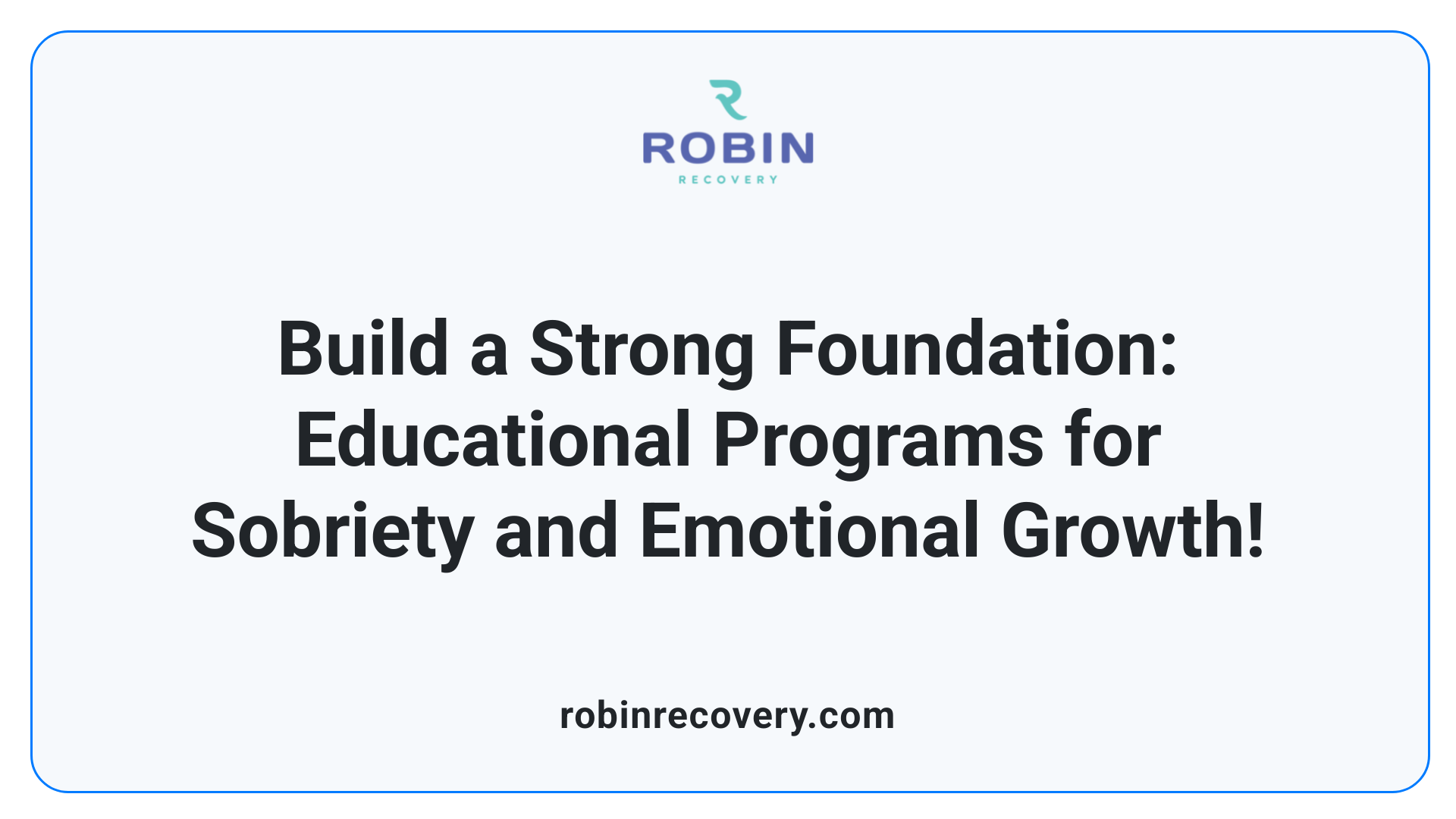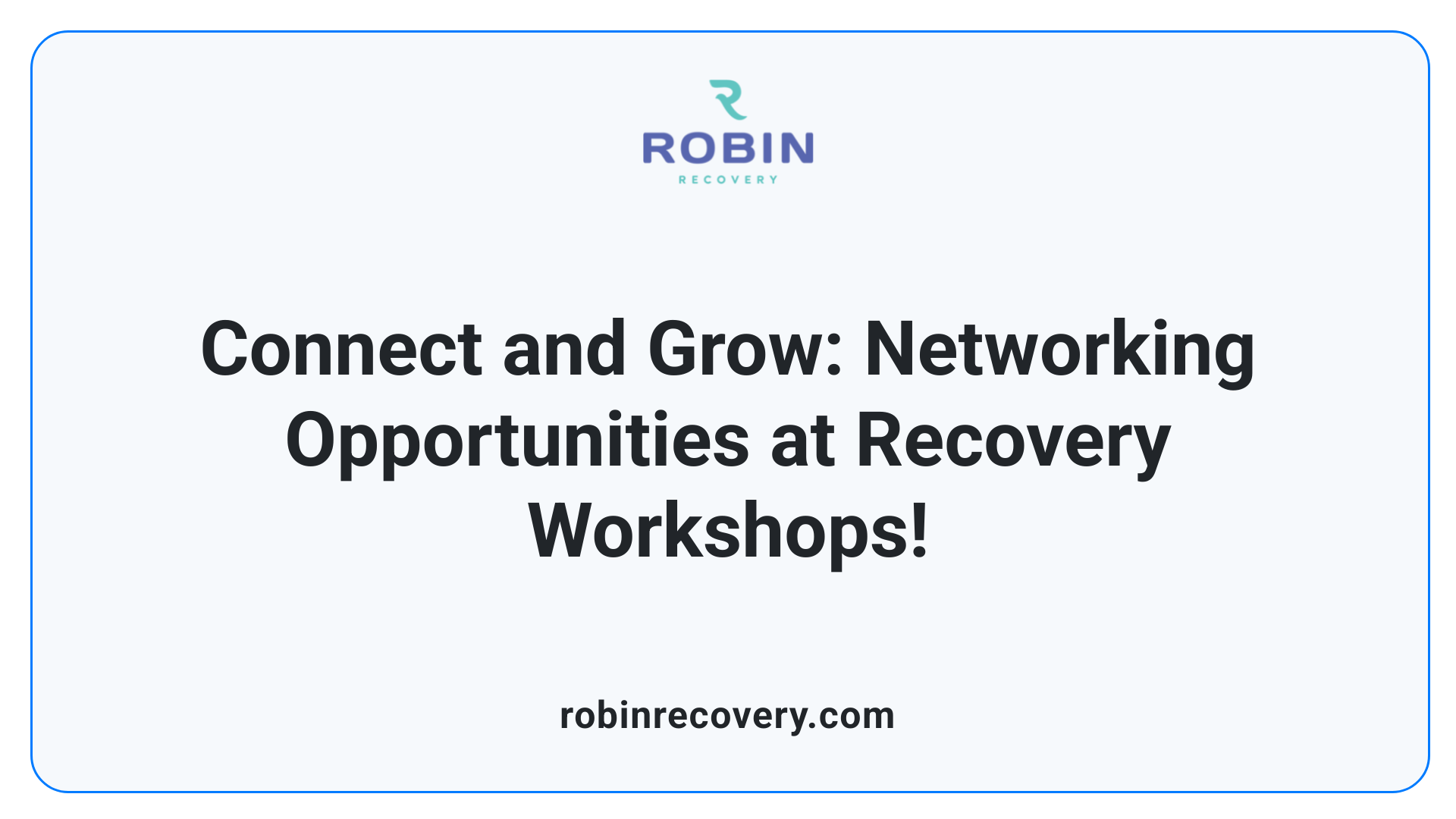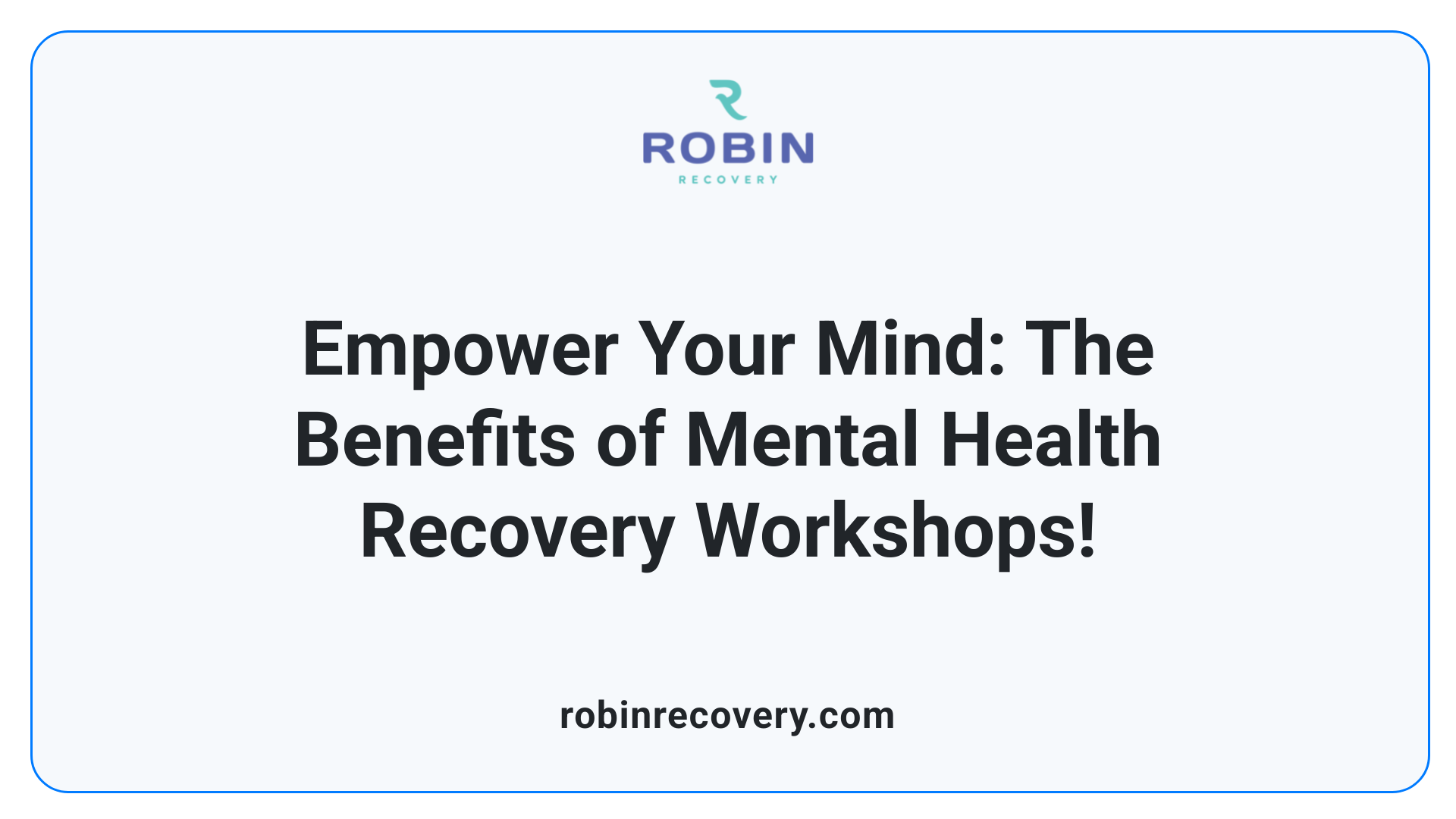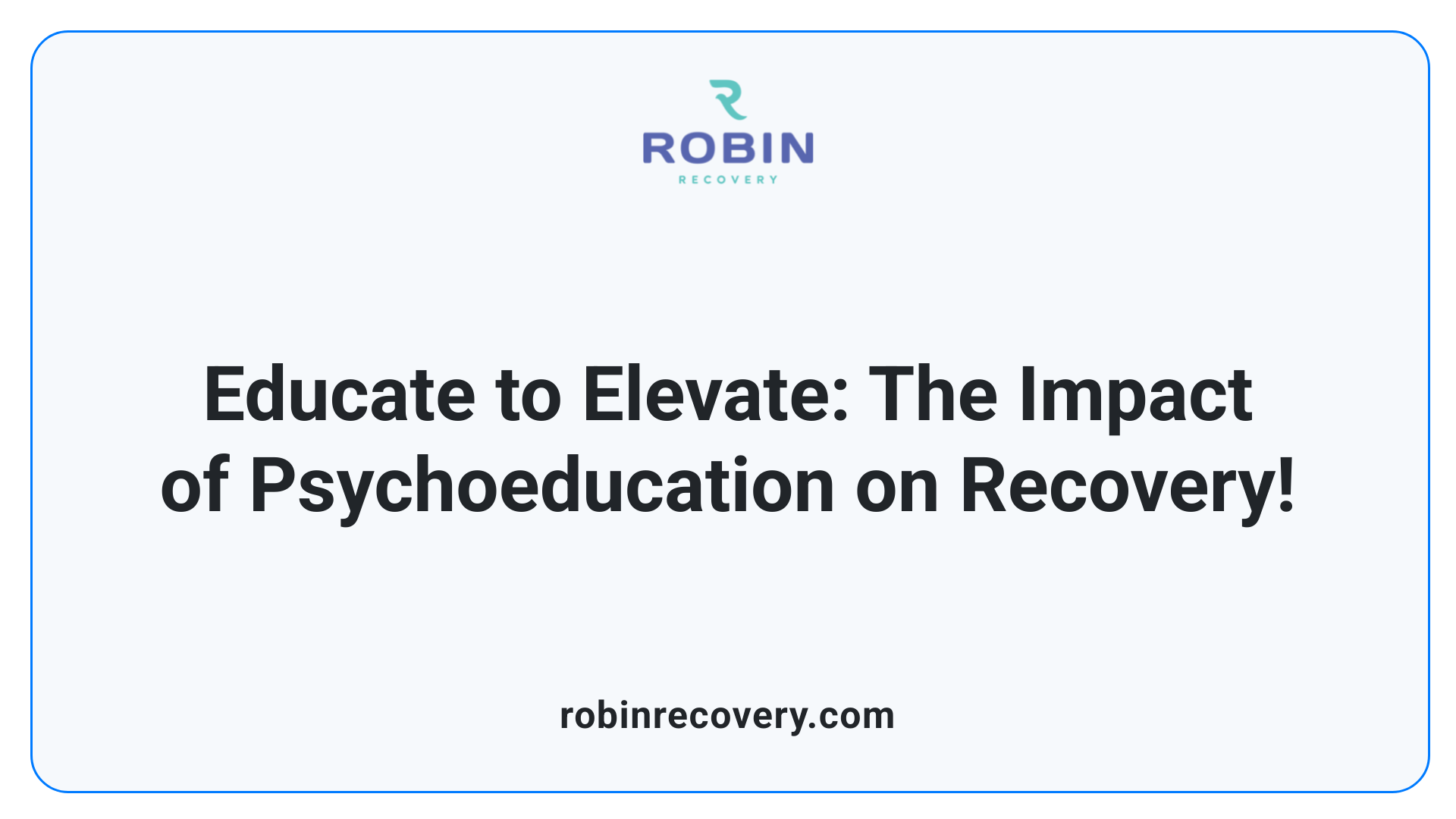The benefits of attending workshops and educational seminars on recovery

Introduction
The journey of recovery from addiction and mental health disorders is multifaceted and complex. One increasingly popular and effective method in this process is attending educational workshops and seminars. These events offer a unique blend of psychoeducation, skill development, and community support that are vital for sustained recovery. Through engaging sessions and interactive learning, participants gain invaluable insights that not only support their sobriety and emotional well-being but also equip them with life skills that are essential for overcoming life's challenges.
Personal Growth and Skill Enhancement Through Workshops

What are the general benefits of attending workshops and educational seminars for personal growth and skill enhancement?
Attending workshops and educational seminars offers a multitude of benefits for personal growth and skill enhancement. These events provide participants witha space to engage deeply in their recovery journeys while learning valuable skills.
- Enhanced Self-Awareness: Workshops facilitate the exploration of personal behaviors and underlying reasons for addiction, fostering greater insight.
- Improved Communication Skills: Participants learn respectful and effective communication techniques, crucial for building healthier relationships and support systems.
- Career Opportunities: Educational experiences create pathways for networking with peers and professionals, which can lead to job opportunities in recovery-related fields.
- Networking with Peers and Experts: Engaging with others in similar situations helps develop a sense of community, providing emotional support through shared experiences.
- Boosted Self-Confidence: Achieving milestones in workshops contributes to a stronger sense of self-esteem, essential for individuals as they pursue recovery goals.
Ultimately, these educational experiences empower individuals to navigate their paths to recovery and personal fulfillment.
Supporting Sobriety and Emotional Growth with Educational Programs

How can educational experiences support sobriety and foster emotional growth?
Educational experiences are pivotal in the journey toward sobriety and emotional growth. They provide participants with crucial insights into the nature of addiction, focusing on how it impacts both the brain and body. By participating in ongoing educational programs, individuals gain essential coping strategies that help manage their recovery and navigate daily challenges.
Workshops and support groups establish a strong sense of community and peer support. Participants can share their experiences, fostering personal growth and accountability. This communal aspect is vital, as it encourages individuals to feel connected and understood, reducing feelings of isolation.
Mindfulness practices integrated into educational settings serve to promote emotional wellness. Techniques such as meditation help individuals develop emotional regulation skills, enabling them to address stressors without reverting to substance use. Additionally, expressive outlets like art therapy allow participants to explore feelings in a safe and creative manner, enhancing self-awareness and personal expression.
In summary, a comprehensive approach that weaves together education, therapy, and community support is crucial for achieving long-term recovery and emotional stability. Participants leave these programs equipped with the tools they need for lasting change.
Networking and Professional Development Opportunities in Recovery Workshops

What networking opportunities and professional development aspects are available through recovery-focused workshops?
Recovery-focused workshops, such as those hosted at the Recovery Leadership Summit (RLS), present invaluable networking opportunities. These workshops gather individuals from various backgrounds who share a common goal of recovery. Participants can connect with one another, leading to the formation of supportive networks that can assist them in their recovery journeys.
One notable event, Hill Day, allows participants to engage directly with policymakers. This engagement not only promotes advocacy for critical recovery issues but also empowers individuals to share their personal stories, effectively influencing public policy.
Furthermore, the Equity Dinner offers a dedicated environment for in-depth discussions on equity in recovery. This creates an ideal setting for advocates and peer supporters to connect and collaborate meaningfully.
Another unique aspect is the Headshot Lounge, a casual yet purposeful space where attendees can update their professional images, thus enhancing their networking efforts while building professional connections.
Overall, recovery workshops create an environment that fosters both personal connections and professional growth through targeted sessions designed to enhance skills and support career advancement.
The Special Focus of Mental Health Recovery Workshops

What specific benefits do workshops focused on mental health recovery offer, such as coping skills and building support networks?
Workshops centered on mental health recovery provide numerous advantages that significantly impact participants' overall well-being. These sessions are designed to equip attendees with essential coping skills, helping them navigate stress, anxiety, and triggers effectively. Participants learn practical techniques that they can apply to their daily lives, fostering resilience against potential setbacks in their recovery journey.
Another critical benefit is the development of support networks. These workshops create a safe and encouraging environment where individuals can connect with peers who share similar experiences. By facilitating open discussions and mutual support, workshops enhance feelings of belonging, which are vital for long-term recovery.
Furthermore, these workshops serve to normalize conversations around mental health issues. By addressing stigmas and misconceptions, participants are empowered to seek help sooner and communicate their struggles without fear of judgment. This early intervention can be key to preventing more significant challenges later on.
The intensive experiences offered during workshops allow participants to dive deeply into their personal challenges, often leading to significant breakthroughs in understanding and self-management. By focusing intensively on their mental health, attendees can emerge with renewed motivation and enhanced coping strategies, paving the way for sustainable recovery and emotional renewal.
The Influence of Psychoeducation on Addiction Recovery

How does psychoeducation improve recovery outcomes and help dispel addiction stigma?
Psychoeducation plays a vital role in enhancing recovery outcomes. By educating individuals about addiction as a chronic, medical condition—rather than a moral failing—it fosters motivation and empowers informed decision-making. When individuals understand the complexities of addiction, they are more likely to engage with their treatment and adopt a proactive approach to recovery.
Furthermore, psychoeducation teaches essential coping strategies and helps identify triggers that may lead to substance use. This knowledge equips participants with the tools to manage cravings effectively and recognize early warning signs, significantly reducing the likelihood of relapse. Studies show that individuals who gain insights into the connection between mental health disorders and substance use can benefit from simultaneous treatment, enhancing their resilience and overall recovery experience.
Additionally, psychoeducation is crucial in addressing and mitigating the stigma surrounding addiction. By educating both those in recovery and their families about addiction, better understanding and support networks are fostered. This communal learning experience not only aids individuals in their recovery journeys but also helps reshape societal perceptions of addiction.
Key Aspects of Psychoeducation
Aspect Description Benefits Understanding Addiction Teaches addiction as a chronic condition Reduces feelings of shame and guilt Coping Strategies Empowers individuals with practical skills Enhances ability to manage triggers and cravings Relapse Prevention Provides tools to recognize early signs of relapse Decreases likelihood of returning to substance use Reducing Stigma Educates families and communities Promotes a supportive environment for healing
By fostering a culture of understanding and support through psychoeducation, individuals can reclaim control over their lives, paving their paths toward lasting sobriety.
The Role of Life Skills Training in Sustaining Recovery
What role does life skills training play in preventing relapse and managing life challenges during recovery?
Life skills training plays a crucial role in preventing relapse and managing life challenges during recovery by equipping individuals with practical tools and coping mechanisms.
Participants learn to identify and manage triggers, such as stress and negative emotions, promoting enhanced self-awareness and emotional control. Key skills taught include:
- Problem-Solving: Helping individuals navigate unexpected challenges.
- Effective Communication: Fostering healthy interaction with others.
- Time Management and Financial Literacy: Essential for achieving independence and stability.
These tools cultivate resilience, enabling individuals to develop supportive routines and practice self-care, which ultimately reduces the risk of relapse. Furthermore, the emphasis on community and accountability in these training programs encourages a holistic recovery experience, focusing on long-term sobriety and overall personal fulfillment.
Conclusion
Educational workshops and seminars serve as a cornerstone in the recovery process, providing the knowledge, skills, and support necessary for overcoming addiction and mental health challenges. By fostering personal growth, supporting sobriety, and offering professional development opportunities, these educational events significantly enhance the recovery journey. Through psychoeducation and life skills training, individuals are empowered to navigate the complexities of recovery and lead fulfilling, independent lives. These workshops create communities of support, break down stigma, and develop resilience, reminding us that recovery is not only possible but sustainable with the right tools and resources.
References
- Academic and Training Opportunities Guide for Recovering Addicts
- The Role of Educational Seminars in Relapse Prevention
- How Workshops Aid in Healing, Recovery, and Emotional Growth
- The Indispensable Role of Industry Conferences in Addiction ...
- Participation in creative workshops supports mental health ...
- The Importance of Continuing Education on Substance Abuse
- Continuing education meetings and workshops - PubMed Central
- Education Workshops | Blue Hills Recovery
- Education Workshops - Harmony Oaks Recovery Center
